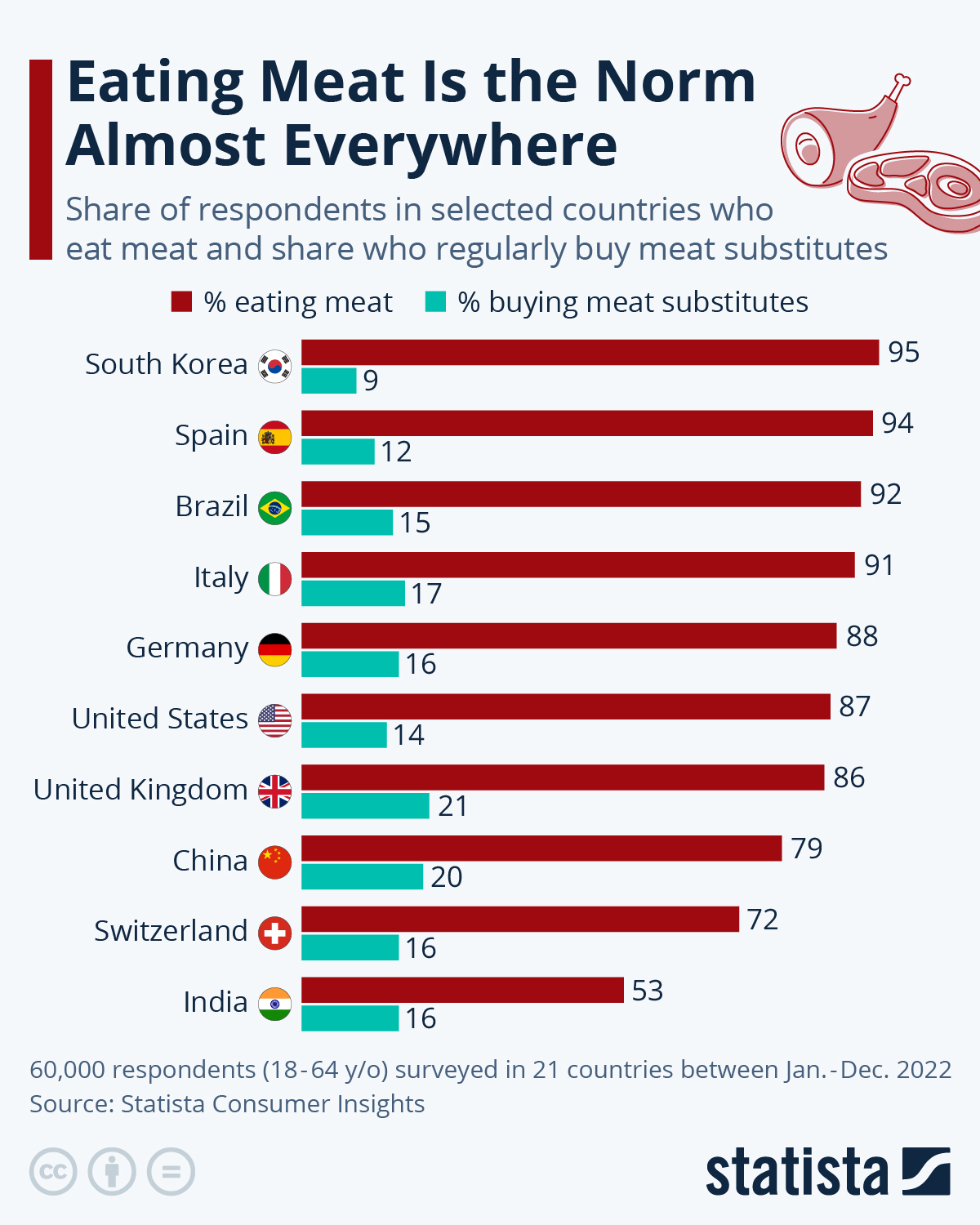
On average, 86 percent of people surveyed for Statista's Consumer Insights in 21 countries said that their diet contained meat – highlighting that despite the trend around meat substitutes and plant-based products, eating meat remains the norm almost everywhere in the world.
You will find more infographics at Statista
As Statista's Katharina Buchholz reports, to satisfy the world's hunger for meat, 340 million tons of it were produced globally in 2021. Because meat consumption typically increases as countries grow wealthier, that number has been rising.
In only three out of 21 countries - Switzerland, China and India - fewer than 80 percent of respondents said that they ate meat. The latter country had the lowest score at 53 percent meat eaters. China still counted 79 percent of respondents saying they ate meat, while that number was 72 percent in Switzerland. India’s penchant for vegetarian fare is connected to Brahmanism or Vedic religion, a belief system connected to the caste of Brahmans, which are highly regarded in the Indian caste system, making vegetarianism equally desirable.
In Western countries, vegetarianism is more often tied to concerns about environmental impact or unethical practices in meat production. Despite higher meat consumption in these countries, meat substitutes are relatively more popular there, ranging from 21 percent of respondents who said they bought them regularly in the UK to 12 percent in Spain and 11 percent in Austria. In China, 20 percent purchase meat substitutes regularly - the highest in the survey due to the Chinese market containing many traditional meat substitutes like tofu and seitan, whose long-standing popularity is intertwined with the history of Buddhism in the country.
The conceptualization of foregoing meat not only as a moral but as an environmental act has led to meat-eaters also purchasing meat substitutes, as the overlapping of figures from the survey suggest.
Regular purchase of meat substitutes was lowest in the meat-loving nation of South Korea, where only 9 percent of people purchase them on the regular.
On average, 86 percent of people surveyed for Statista’s Consumer Insights in 21 countries said that their diet contained meat – highlighting that despite the trend around meat substitutes and plant-based products, eating meat remains the norm almost everywhere in the world.
You will find more infographics at Statista
As Statista’s Katharina Buchholz reports, to satisfy the world’s hunger for meat, 340 million tons of it were produced globally in 2021. Because meat consumption typically increases as countries grow wealthier, that number has been rising.
In only three out of 21 countries – Switzerland, China and India – fewer than 80 percent of respondents said that they ate meat. The latter country had the lowest score at 53 percent meat eaters. China still counted 79 percent of respondents saying they ate meat, while that number was 72 percent in Switzerland. India’s penchant for vegetarian fare is connected to Brahmanism or Vedic religion, a belief system connected to the caste of Brahmans, which are highly regarded in the Indian caste system, making vegetarianism equally desirable.
In Western countries, vegetarianism is more often tied to concerns about environmental impact or unethical practices in meat production. Despite higher meat consumption in these countries, meat substitutes are relatively more popular there, ranging from 21 percent of respondents who said they bought them regularly in the UK to 12 percent in Spain and 11 percent in Austria. In China, 20 percent purchase meat substitutes regularly – the highest in the survey due to the Chinese market containing many traditional meat substitutes like tofu and seitan, whose long-standing popularity is intertwined with the history of Buddhism in the country.
The conceptualization of foregoing meat not only as a moral but as an environmental act has led to meat-eaters also purchasing meat substitutes, as the overlapping of figures from the survey suggest.
Regular purchase of meat substitutes was lowest in the meat-loving nation of South Korea, where only 9 percent of people purchase them on the regular.
Loading…






